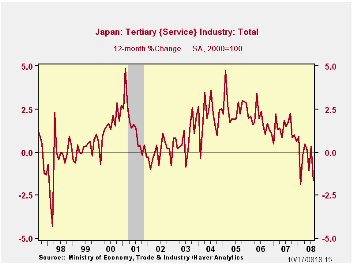 Global| Oct 17 2008
Global| Oct 17 2008Japan’s Service Sector Index Gets Erratic
Summary
The tertiary index fell in August after two months of stability. The Yr/Yr percentage change in the index is hovering in negative territory and has just taken a weaker position with this report. The index is still in the top 10% of [...]

The tertiary index fell in August after two months of stability. The Yr/Yr percentage change in the index is hovering in negative territory and has just taken a weaker position with this report.
The index is still in the top 10% of its range but then the service index usually does rise. Setbacks to it are uncommon. The weakness in the tertiary index is another red flag for the slowing in the Japanese economy.
The declines in the tertiary index in this period already rival the drops in the previous recession period from 2000-2003.
| Up to date Japan Industry Survey | |||||||||
|---|---|---|---|---|---|---|---|---|---|
| Recent Months | Moving Averages | Extremes; Range | |||||||
| Aug-2008 | Jul-2008 | Jun-2008 | 3-Mo | 6-Mo | 12-Mo | Max | Min | %-Tile | |
| Tertiary | 109.1 | 110.6 | 109.3 | 109.7 | 109.8 | 109.9 | 110.9 | 92.0 | 90.5% |
| Ranges, Max, Min since 1993 | |||||||||
Robert Brusca
AuthorMore in Author Profile »Robert A. Brusca is Chief Economist of Fact and Opinion Economics, a consulting firm he founded in Manhattan. He has been an economist on Wall Street for over 25 years. He has visited central banking and large institutional clients in over 30 countries in his career as an economist. Mr. Brusca was a Divisional Research Chief at the Federal Reserve Bank of NY (Chief of the International Financial markets Division), a Fed Watcher at Irving Trust and Chief Economist at Nikko Securities International. He is widely quoted and appears in various media. Mr. Brusca holds an MA and Ph.D. in economics from Michigan State University and a BA in Economics from the University of Michigan. His research pursues his strong interests in non aligned policy economics as well as international economics. FAO Economics’ research targets investors to assist them in making better investment decisions in stocks, bonds and in a variety of international assets. The company does not manage money and has no conflicts in giving economic advice.
More Economy in Brief
 Global| Feb 05 2026
Global| Feb 05 2026Charts of the Week: Balanced Policy, Resilient Data and AI Narratives
by:Andrew Cates






